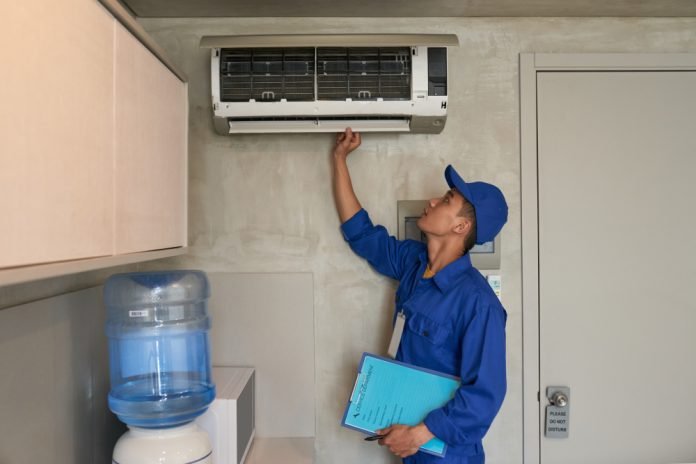Every enclosed space, including your offices and homes, acts as an individual
microenvironment; we must manage these spaces for comfort, safe, and valuable. HVAC
systems are designed to make buildings healthier and safer. An HVAC technician installs,
repairs, and maintains the system to control the buildings’ temperature and air quality.
If you have just retired from military service and are looking for a job where you can use your technical and mechanical skills, there is nothing better than the HVAC industry. Using the skills you learned in the military, you can complete HVAC training and have a great career after military service.
This article will discuss HVAC technicians and how a veteran can choose this career path.
We’ll also discuss if this is a good line of work for people who’ve retired from the military.
WHAT ARE HVAC SYSTEMS?
HVAC stands for Heat, Ventilation, and Air Conditioning. The purpose of HVAC systems is to
control the flow of heat, air, ventilation, and air conditioning in a building. Unlike other
building elements such as walls, ceilings, beams, or columns, you won’t necessarily see
HVAC systems directly when you enter a building. However, you’ll feel the presence of a
relaxing and well-ventilated environment.
In simple terms, HVAC systems exchange air between indoor and outdoor spaces. They
maintain the temperature in a residential or commercial building by heating or cooling the
area. It’s also responsible for maintaining the air quality in the building.
WHO IS AN HVAC TECHNICIAN?
An HVAC technician is a skilled professional who installs, maintains, and repairs heating,
ventilation, air conditioning, and refrigeration systems in residential or commercial buildings. They are also responsible for controlling and maintaining the temperature and air quality in the building.
Technicians accomplish this by designing, installing, testing, inspecting, maintaining, and
repairing the systems that keep the space cool on hot days and warm during cold days.
As a technician, you can train in all three areas, but you can also choose to work strictly in a single domain. Additionally, you can also specialize in a specific kind of HVAC system.
Because there are so many opportunities in the industry and the demand is constantly
growing, HVAC technicians can use their mechanical skills to have a promising career.
WHAT DOES AN HVAC TECHNICIAN DO?
HVAC systems control temperature, air quality, and humidity in buildings, making them one
of the most vital components of building services. As an HVAC technician, you’re primarily
responsible for ensuring that the civilian population has a climate-controlled environment in
which they feel safe and comfortable.
You will find yourself doing one of the following daily tasks as an HVAC technician.
● Studying building and system blueprints and other specifications
● Checking electrical components or circuits for continuity or breakage
● Testing the connecting joints or pipes for leaks
● Repair or replace old and defective system components
● Improve performance of HVAC systems by cleaning ducts, changing filters, or refilling
refrigerants
● Connecting HVAC systems to water, fuel, or refrigerant sources
● Installing, connecting, or adjusting humidifiers, thermostats, or timers
● Adjusting controllers to balance the system
● Drilling or cutting holes in building structures to install systems
● Assembling, positioning, and mounting the system
● Documenting the installation of HVAC systems and updating records
● Laying out, designing, and installing low-voltage electrical cables
● Discussing HVAC systems, equipment parts, technologies, and problems with
customers
● Selling equipment or future contracts
HVAC technicians start their day by learning about the job and visiting the customer. You can also work as a freelance technician, where customers can contact you directly.
If you’re just starting, we recommend working with an expert first. This way, you can
understand the process and learn new skills. Then, with enough experience, you can start
your own business and serve your customers.
BECOMING AN HVAC TECHNICIAN AS A VETERAN
About 7.3% of Americans choose to serve in the military. Some stay with it their entire lives; most use it as a starting point for their civilian careers. The military is a place where you can learn marketable skills that you can use to build your career as a veteran.
Becoming an HVAC technician is a good idea if you are a veteran looking for an excellent
post-military career. You can put your technical and mechanical skills to work in this profession.
When you have served in the military and are now in the civilian market, there is a good
chance you won’t be pursuing a four-year degree. Office work can also seem monotonous
compared to the practical and adventurous life in the military.
To become an HVAC technician as a veteran, you will need to obtain some training or a
diploma in the field and sometimes a license.
If you are getting out of the military and want to become an HVAC technician, you must get a diploma in that category. There are several community colleges or technical schools that
offer these courses.
DETERMINE THE TYPE OF COURSE AND YOU WANT TO PURSUE
You can opt for an online course or a classroom program if you’re looking for colleges. You
can opt for the online system to be more flexible regarding location or time. However, you
won’t get any hands-on training in this course. In a face-to-face program, you must follow a specific schedule and attend classes at a particular location. You also get hands-on
experience with actual equipment during the course.
GETTING VA EDUCATION BENEFITS
As a veteran, the state would help you get the degree of your choice. These educational
benefits are crucial when you are choosing the course. The GI bill introduced by the
government helps qualifying veterans and their family members get money for their school o training. Depending upon your qualification, the bill would cover the program’s costs or a
significant portion.
The amount of money you would be assigned for your books, tuition, or housing would
depend on your chosen program. You can also use these benefits to enroll in a graduate
program. The VA education benefit program would pay your tuition and fees directly to the
school. You will also get a housing allowance at the end of each month.
The best part about these education benefits is that you can even study at a foreign school
of your choice. You can use your education benefits to enroll in a foreign school if:
● You are eligible for VA educational assistance as a veteran or service member
● The committed has approved your program
● Your program is at an institution of higher learning where you’ll earn a standard
associate degree or higher.
To understand the coverage, you must apply to the GI bill education benefit program. With
the statement of benefits, you can analyze how many of your benefits you have used and
the ones that are left. This would help you plan your course and future in a better manner.
ENROLLING IN THE PROGRAM OF YOUR CHOICE
Once you have decided on a course of study, you’ll need to go through the application
process. You can do this by visiting the college’s website and clicking on the link for
admission. You’ll then be redirected to the form. Simply fill it out and follow the instructions to enroll in the program. You can receive your diploma within a few months or a year,
depending on your chosen program.
When you finish your diploma course, you will need hands-on training in the HVAC industry.
Paid and unpaid internships will help you better understand the challenges. Apprenticeships
usually pay half the rate of more experienced HVAC contractors in your area.
DETERMINING YOUR APPRENTICESHIP OPTIONS
There are several apprenticeship opportunities in different states across the country. The
best way to find them is to search the internet for “[state name] HVAC apprenticeship.” The
search results will include links to the state’s Department of Labor and other private
organizations that offer HVAC apprenticeships
SELECTING APPRENTICESHIP OPPORTUNITIES AND FILLING OUT THE APPLICATION
Apprenticeship applications are very similar to job applications. You should ensure the
position for which you can apply is available. Follow the instructions on the website and fill
out the form. You can also apply for several apprenticeships.
GETTING SELECTED FOR THE APPRENTICESHIP
If you fulfill the apprenticeship’s basic requirements, you are on the list for 90 days. Then, as a qualified applicant, you should have a few interviews with the apprenticeship committee.
After that, you’ll be selected based on your evaluation. To begin the training, you must pass
the pre-employment drug test.
COMPLETING THE APPRENTICESHIP
To start as a professional HVAC technician, you must complete the apprenticeship. Most
apprenticeships require a minimum of 2000 hours of on-the-job training and 144 hours of
in-class training.
Not all veterans need to be licensed professionals. However, if you have completed an
HVAC apprenticeship, you must check to see if your state requires licensure.
DETERMINE IF YOU NEED TO BE LICENSED
Not all states require licensing. You can check the internet to see if your state requires HVAC technicians to be approved. But even if your state doesn’t require a license, some employers may make it mandatory. A license or certificate shows that you’ve specific skills and have been tested for them.
States that don’t require licensing are:
● Colorado
● Illinois
● Indiana
● Kansas
● Maine
● Missouri
● New Hampshire
● New York
● South Dakota
● Vermont
● Wyoming
DETERMINE THE REQUIREMENTS FOR LICENSING
There are various certifications and licenses in the HVAC industry. You can choose one of
the fields and look for the appropriate license. To get your license, you would need to pass
some exams. You can check the internet for your state’s licensing requirements and prepare
accordingly.
SUBMITTING YOUR APPLICATION AND DOCUMENTS
Based on the info you found on the internet, you need to gather all the documents and fill out the application form. Submit your documents to the state for licensure. While submitting your applications to the department, you will need to get a background search done. For this, you will have to submit your fingerprints.
You can use an FDA-approved fingerprinting center to submit your prints. Florida Electronic
Fingerprinting Service, a Veteran founded Florida live scan electronic fingerprinting provider,
has several locations. They submit your fingerprints to the department the same day and
generate a report within three business days.
PASS THE LICENSING EXAM
Once the licensing application has been submitted, it will be reviewed by the state. If
approved, you will have to take an exam to ensure you have enough knowledge about
HVAC systems. Once you pass the exam, you’ll receive your license.


